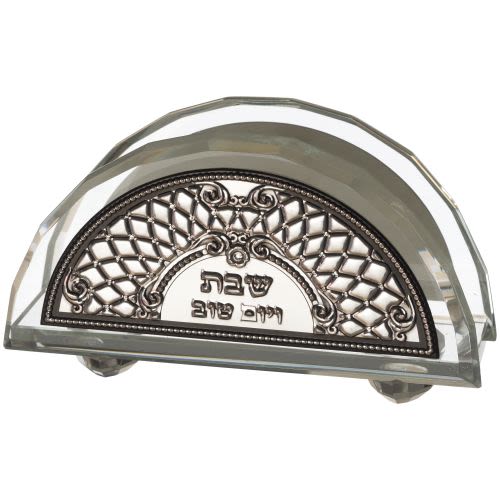
Smart Shopping
The Melitzer Rebbetzen shows how we fall prey to very sophisticated advertising that has nothing to do with our values. Today, it’s a challenge to be a smart shopper…

Smart Shopping, Part 1
In case you don't have access to a calendar or any other method of telling which time of year it is you can always find out whether its summer or winter, and which Yom Tov or occasion is coming up by the advertising flyers and brochures flying into your mailbox on a regular basis – that is, if you live in Israel or in a Jewish neighborhood. The adverts are faithful recorders of what we should be doing – and more important buying – (according to the advertisers) at any given time of the year.
We in Ashdod, are given three opportunities a week to buy whatever our heart desires; Sunday, when the advertisement brochure is called, very creatively, "Beginning of the Week", Tuesday, with a brochure called "Middle of the Week", and Thursday evening with "Kol Hakrayot" ("Voice of the Kiryot". The religious part of Ashdodwas originally a collection of little kiryot, settlements, until it developed and grew into a town).
The two weekly brochures are in black and white, and the week-end one is in glorious technicolor. I very often marvel at the ingenuity and creativity of the graphics artist, that she is able to take a perfectly mundane item and change it into a most "desirable" object; some of those advertisements are so appealingly presented that they really make you want to buy the item advertised. It makes you feel that if you buy it you will have obtained your "hearts desire" – which "of course" will lead to "happiness and fulfillment".
According to the advertisements I have been seeing for the past few years you will not feel true "freedom from slavery" on Pesach if you do not spend the Yom Tov in some luxury hotel amid breathtaking landscapes with all the worldly pleasures you could dream of.
One thing I know for sure is that if you do choose to spend Pesach in a hotel you certainly will be "freed" – from having to make the "difficult decision" of what to do with the large amount of money you would still have in your pocket had you not gone to the hotel.
And what about that beautiful silver menorah that, according to the advertisements, you "must have" in order to fulfil the mitzvah of lighting the Chanukah candles? Were the stainless steel and the silver-plated menorahs that we used posul, and did we perhaps not fulfil the mitzvah of Chanukah by using them? And if that's the case, I shudder to think what Hashem thought of the tin (or even hollowed out potato) menorahs that some of our forefathers lit their lights in with such kavonoh (intent) that the heavens shook with their prayers.
All joking aside, I feel that the best way to spend any Yom Tov, whether a full Yom Tov like Pesach or a "half" Yom Tov like Chanukah is at home, and for two reasons:
You can only feel true simchas Yom Tov in your own home, amidst your own family and surrounded by your own possessions and comforts; one has the exhilarating feeling that one has cooked and prepared for the Yom Tov oneself. And as you look at the sparkling white tablecloth on the table with the lecht on it shining so radiantly, and your family sitting round the table eating the Yom Tov seudah that you have prepared, can anything equal the beauty of that scene and the feeling of nachas and pride; (although when you're faced with a mountain of dishes afterwards perhaps the "pride" in having to wash those dishes is a bit muted).
But there is another longer-term issue involved here. One of the things we want our children to grow up with is the feeling that the home is a joyful and happy place to be in, a place of simchah. Yomim Tovim are one of the best ways of bringing simchah into your home and promoting family togetherness. It's a time to step off the spinning carousel of daily life and to turn inwards towards the family and enjoy quality time with them; Yom Tov is a little oasis amidst the rat race of life.
The memories of the Yomim Tovim that your children will take with them will never be forgotten. Even when they remember the rush and bustle of erev Yom Tov it will evoke a smile and a "but do you remember what it was like on erev……?" And if the home was a happy home, then by extension yiddishkeit itself will also be seen as joyful and happy.
Returning to the subject of advertisements, I particularly enjoyed an advertisement once that featured a palatial residence with a grand hall and staircase, plush carpeting and expensive, old world furniture. The caption on the picture was "Fit for a King"; and what do you think was advertised – nothing other than men's suits. The picture itself appealed to me simply because I thought that the setting was right for us Yidden because our men really are b'nei melochim, princes; they, together with us are part of Hashem's royal family.
After I had enjoyed the picture for a while I looked at it again from the advertising point of view and came to the conclusion that it was a very clever piece of work; it subtly pandered to our silent yearnings and tapped into our "need" for kovod – prestige – without saying a word.
The art of advertising is about getting people to buy something that they don't really need right at that moment; millions of dollars are spent on finding out what makes people tick and what will appeal to them. I once read a whole book on the art of marketing and I was absolutely fascinated by it. At the same time it was also frightening to see how closely the authors had studied the habits, needs, likes, dislikes and even psychological makeup of both men and women of all ages in order to maximize the "buying" appeal of merchandise.
I had always complained that the supermarkets change the display of their goods around every few weeks. I used to say "I've only just got used to the latest arrangement and now that I finally know exactly where to go to find my tea and washing powder – they've gone and changed everything round again." In fact I found it so irritating that I went back to my little grocery store where everything has been in the same place for as long as I can remember. When I actually compared the grocery's prices to supermarket prices I found that, apart from a few "lead items" in the supermarket the local store's merchandise was actually cheaper.
Well after reading that book I now know that changing the displays round in the supermarkets is a very deliberate strategy; that it's done especially to make customers pass through a lot of aisles they wouldn't normally go through if everything was always in the same place; current marketing theory is that people are "jogged" into buying more this way. (And if this strategy is still being used it must work extremely well).
Another method of making you walk through "unnecessary" aisles is to place basic necessities which you can't do without towards the back of the store. Or if they're not at the back they're on a low shelf in the aisle; the philosophy behind this is that you'll bend down for a necessity but not for an item that isn't so vital.
And in the meantime the not-so-necessary items are at hand level and staring you in the face, attractively packaged and shouting out "buy me, I want to be yours"; all you have to do is take it and put it into your shopping basket or trolley and it is "yours". Or the sweets and gum that are strategically placed next to the checkout counters, so that as you're waiting to pay you'll pop a few in your basket or trolley.
Even the different types of music that are piped through the stores are also part of this strategy. If the store is playing calm, soothing music it's to make you feel relaxed so that you're not in a rush to go anywhere and will spend more time shopping. If it's loud, modern music (in the trendy shops) it's to hype you up so that you'll lose your inhibitions and spend money more freely.
In truth I must admit that the authors of the book were correct in their assessments and absolutely on target. To offset this I can only quote you what my mother ob"m always said to us when we discussed this subject "Firstly, never go shopping when you're hungry; and secondly, always take a shopping list with you and only buy what's on it".[1]
I have also noticed another fairly new phenomenon in advertising that of using pesukim from the Torah to advertise goods for sale and this really upsets me. The advertisers are taking parts of the holiest and most revered object we as Yidden possess and dragging it down to the low level of gashmius. It's as if you are dragging the queen's crown in the gutter, or as the posuk in Mishlei says, “(you are putting) A golden ring in the nose of a hog".
And in order to explain why I feel this way, let's put the holiness of a Sefer Torah into context by clarifying what it means to us as Jews.
The first Sefer Torah was dictated by Hashem directly to Moshe Rabbeinu at Har Sinai. Hashem "said" the Aseres Hadibros directly to the Yidden but after that He dictated the rest of the Torah directly to Moshe Rabbeinu who wrote it down exactly as he received it, letter for letter and word for word, without attempting to change it (or make it more palatable) in any way.
Because the Torah was given by Hashem directly it has never been and can never be changed. It is the only written text that has remained unchanged for the past four thousand years, and the entire method of producing and writing a Sefer Torah has not changed from the time it was given to us at Har Sinai. The tiniest difference or mistake renders a Sefer Torah possul, unfit.
THE WORDS OF THE TORAH ARE HASHEM'S OWN WORDS AND ARE THE EXPRESSION OF HIS WILL ON THIS EARTH.
To be continued.
* * *
1. Another tried and tested method of saving money is to do your shopping over the phone and to this end I prevailed upon a friend of mine who is a very busy person to phone her twice-monthly shopping order in to the supermarket instead of going there personally. The results, after two months were quite astounding and my friend phoned me up to tell me about it. Apart from saving an afternoon each time she made an order, she found that her shopping bills had been cut by ……. 33%! (I'm not exaggerating; those were her words to me). Her total bill each time was, on average, 1/3rd less than it used to be; and you are talking about a person who is not an impulsive buyer, but is a cautious, calculated shopper. Because she phoned her order in she did not see all that was available and buy so-called "necessities" or "bargains". And even though her bills were much lower than before my friend did not feel that there was anything lacking in her home. Even I was surprised by this because although I knew from experience that she would save some money, I didn't think it would be that much.











1/05/2009
Kol Hakavod! Kol Hakavod Rebetzin!!! I agree 1000%. These things should be publisized more and even put up on pachkvilim all over E’Y.
1/05/2009
Kol Hakavod Rebetzin!!! I agree 1000%. These things should be publisized more and even put up on pachkvilim all over E’Y.